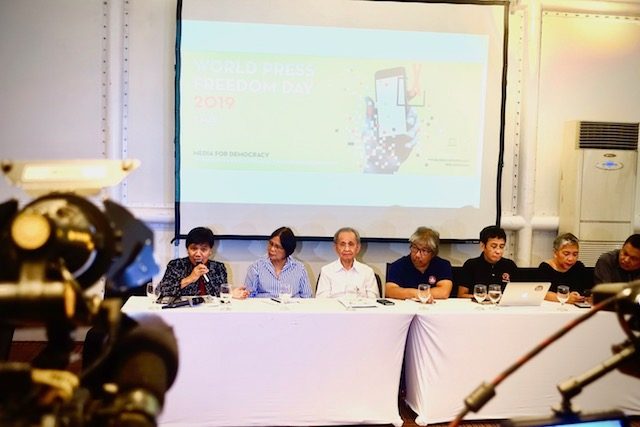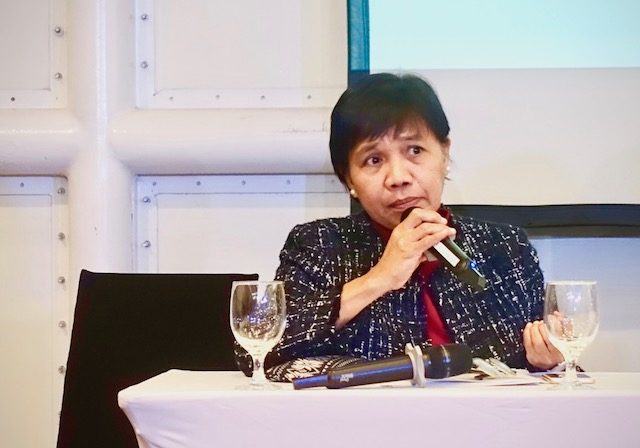SUMMARY
This is AI generated summarization, which may have errors. For context, always refer to the full article.

MANILA, Philippines – On World Press Freedom Day, leading Philippine veteran journalists called out the Duterte administration for applying double standard on the issue of foreign funding – hitting media organizations for receiving foreign funds without acknowledging that it does the same.
The government has been using grants from other nations and institutions, most recently those from China, the journalists said.
“They are demonizing foreign funding. They should study what foreign funding is. Because there’s nothing wrong [with] accepting assistance from foreign organizations,” Vera Files president Ellen Tordesillas said in a mix of English and Filipino, during the panel discussion of the media freedom forum organized by the Freedom for Media, Freedom for All network on Friday, May 3.
“The government itself [accepts foreign aid]. Look at the press release of Malacañang last week. The President came from China bringing in billions-worth of grants and loans,” Tordesillas said.
No less than the government’s own media apparatus benefits from China, according to Malou Mangahas, executive director of the Philippine Center for Investigative Journalism (PCIJ).
Presidential Communications Operations Office (PCOO) Secretary Martin Andanar announced in March that it will receive P150 million worth of equipment from China on top of an earlier donation worth P140 million.
“And now you see how it could be so double standard, the way they are doing it. Foreign funding from non-China, not good. Foreign funding from China, very good. So we’re really very confused about where this government is bringing the discourse,” Mangahas said.

The journalists addressed the issue in the wake of the publication of a report linking independent media groups to an alleged destabilization plot against President Rodrigo Duterte. Presidential Spokesman Salvador Panelo conceded that the report came from no less than the President, but backtracked later to say it came from an “unknown source.” (READ: Malacañang’s copy of ‘ouster matrix’ came from unknown number)
The report came with the accusation that the news organizations named there – PCIJ, Vera Files, and Rappler – receive funding from Western governments and are therefore influenced by them.
News organizations receive funding from foreign organizations, but for grants and investments that do not lead to ownership. Laws do not bar news organizations from accepting funds, only ceding ownership. (READ: Just the facts: Foreign funding isn’t the problem)
“Those funds are not used to remove anyone who’s in Malacañang, but for the good of the nation,” Tordesillas said, citing training they have offered to over a thousand local and national reporters in the Philippines.
The same goes for the government as it receives grants and funding from more developed countries, most notably from China and the United States. On top of these are loans, which would later be paid with Filipino taxpayers’ money. (READ: Made in China: Loan terms with waivers, shrouded in secrecy)
According to research by Rappler, the Philippines’ touted “blooming” relationship with China has produced over 100 deals, pledges, agreements, or donations between the two countries as of 2018.
‘To silence a voice’
Why is the Philippine government doing this?
Nonoy Espina of the National Union of Journalists of the Philippines (NUJP) said the attacks are meant to discredit and undermine a free press.
“Whatever the motive, it is to silence a voice,” Espina said.
This was echoed by Rappler CEO and executive editor Maria Ressa, who’s facing at least 11 complaints and cases filed in the last 14 months.
Ressa said the anti-foreign funding discussion is meant to “manipulate” the public in the same way the the government relied on trollls to spread its propaganda against journalists. (READ: Propaganda war: Weaponizing the internet)
“This is a way to manipulate the Filipinos to say that just because international funding comes through, that you must be beholden to them. Well, we’ll turn that right back against the government, because the government is the biggest receiver of foreign funding,” Ressa said.
She added: “Does that mean that when it accepts money from China it becomes China’s vassal? It has accepted tremendous amounts of money from US AID, local governments, and national governments.” – Rappler.com
Add a comment
How does this make you feel?
There are no comments yet. Add your comment to start the conversation.